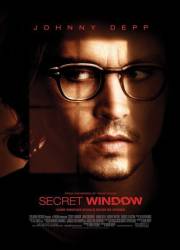Continuity mistake: When Mort is in Ken's office telling him about John harassing him. Ken punches the right side of the chess clock down to start it. Then Mort punches the left side, his right to stop it. Then when the camera switches back to Mort's point of view the the left side is up and the right side is down, then Ken punches down the left side to start it, when the right side should have been the one he had to press down to start it.

Secret Window (2004)
Ending / spoiler
Directed by: David Koepp
Starring: Johnny Depp, John Turturro, Maria Bello, Timothy Hutton
In the end it is revealed that John Shooter (Turturro) is actually a personality of Mort Rainey (Depp) who has dissociative identity disorder. In the end, Shooter overwhelmed him, becoming the dominant personality, essentially destroying Mort. It is clear that Shooter pushed Rainey to correct his life, not the story, to take his revenge and kill his wife, Amy (Bello), whom he was currently going through a divorce with. After being confronted, Shooter took control of Rainey's body as Mort Rainey was unable to live with what Shooter had done on his behalf and performed a sort of 'mental suicide', as was hinted to by Shooter (now played by Depp) with the comment of "Now I never put a hand on him, Misses, I swear, he took the coward's way out." A fight ensued between the two, ending with Amy laying behind the house in the garden, wounded, unable to flee. Ted (Hutton) arrives, lured behind the house by Amy's screams. Shooter (Depp) kills both Amy and Ted with a shovel. Before he kills Amy, as he advances upon her, he recites the true ending of "Secret Window", the one he wanted Mort Rainey to replace with the 'ruined ending' Mort wrote. "'I know I can do it,' Todd Downey said, helping himself to another ear of corn from the steaming bowl. 'I'm sure that in time, every bit of her will be gone, and her death will be a mystery, even to me.'" He goes into town to shop, where the locals become unnerved by his presence, either tensing up or fleeing from the store. Later the Sheriff arrives at "Rainey's" cabin, discovering masses of corn in the kitchen. Rainey/Shooter is upstairs at the desk, now speaking in a confident manner, void of his Mississippi accent. The Sheriff tells 'Rainey' to stay out of town, they know what he did and that as soon as they found the bodies they could tie it to him. Rainey/Shooter agrees to shop out of town, grinning at the Sheriff as he states that the ending is the only thing that matters "This one's very good, this one's perfect." The last scenes are a tightly packed row of corns, growing in Amy's garden, now Amy and Ted's grave site, and Shooter/Rainey biting into an ear of corn.
Julian
Mort: I don't care. I'm just gonna smoke. I'm just gonna totally smoke. I'll finish these, go to the store and get a brand-new pack, smoke the shit out of that one.
Trivia: One should really stay to the very end of the credits, as Johnny Depp (Mort) sings an amusing little tune.
Question: What is the year and trim level of the jeep Cherokee Johnny Depp drives?
Join the mailing list
Separate from membership, this is to get updates about mistakes in recent releases. Addresses are not passed on to any third party, and are used solely for direct communication from this site. You can unsubscribe at any time.
Check out the mistake & trivia books, on Kindle and in paperback.




Answer: 1993 Jeep Cherokee Country.